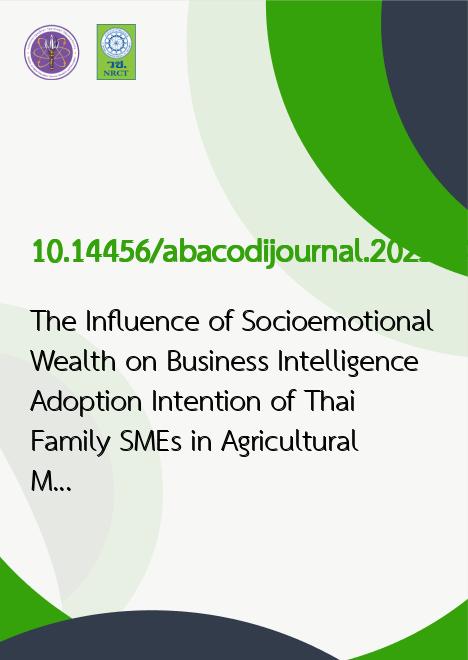
|
The Influence of Socioemotional Wealth on Business Intelligence Adoption Intention of Thai Family SMEs in Agricultural Machinery Business |
|---|---|
| รหัสดีโอไอ | |
| Creator | Porramet Wangwongwiroj |
| Title | The Influence of Socioemotional Wealth on Business Intelligence Adoption Intention of Thai Family SMEs in Agricultural Machinery Business |
| Contributor | Paitoon Porntrakoon |
| Publisher | Graduate School of Business and Advanced Technology Management - Assumption University Thailand |
| Publication Year | 2568 |
| Journal Title | ABAC ODI Journal Vision. Action. Outcome |
| Journal Vol. | 13 |
| Journal No. | 2 |
| Page no. | 120-146 |
| Keyword | business intelligence, adoption intention, technology-organization-environment framework, diffusion of innovation theory, socioemotional wealth, family firms, small and medium-sized enterprise |
| URL Website | https://assumptionjournal.au.edu/index.php/odijournal/index |
| Website title | ABAC ODI Journal Vision. Action.Outcome |
| ISSN | 2408-2058 |
| Abstract | The modern business environment demands rapid and effective decision-making, facilitated by tools that can process and analyze data from multiple sources. Business Intelligence (BI), as an effective tool, has been adopted, aiding organizations of all sizes in making fact-based decisions across tactical and strategic levels. Small and medium-sized enterprises (SMEs) encounter limitations in various facets ranging from management, resources and including information technology adoption. Family firms possess unique characteristics, Socioemotional Wealth (SEW). This term is described as the collection of non-financial characteristics inherent to family businesses that satisfy the emotional needs and preferences of members of the family firms. Socioemotional wealth influences decision making of family firms. This empirical study focuses to determine the factors which influence business intelligence adoption intention of Thai family SMEs in agricultural machinery business. The study investigates direct effects of factors and moderating effects of age as moderator on business intelligence adoption intention. The foundation of the theoretical model was constituted from Technology-Organization-Environment (TOE) framework combined with factors from Diffusion of Innovation (DOI) theory, Manager innovativeness factor and socioemotional wealth dimensions. The final samples comprise of 384 respondents who are managers and members of Family SMEs in agricultural machinery business in Thailand. This empirical research found that BI adoption intention was significantly affected by a number of variables. These variables, ordered by highest to smallest effect sizes, encompass organization readiness, top management support, relative advantages, renewal of family bonds, emotional attachment, competitive pressure, manager innovativeness and perceived cost. The empirical evidence suggests that age does not function as a significant moderator in this study. |